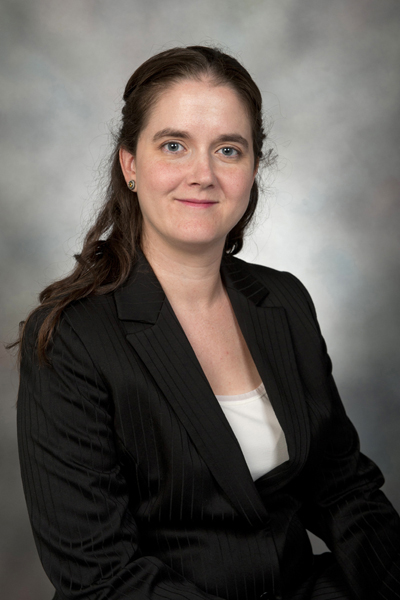Public officials are used to hearing economists’ expertise on decisions about the economy and listening to diplomats about foreign policy, so why shouldn’t scientists help national, state and local leaders make better decisions about science and technology?
 That question was at the heart of a recent talk by Dr. Kirstin Matthews, a College of Natural Sciences alumna who returned to campus to speak about the role of scientists in public policy. Matthews, a leader in the Science and Technology Policy Program at Rice University’s Baker Institute for Public Policy, was invited to speak as part of the College’s ongoing Professional Development Seminar Series for graduate students and postdocs.
That question was at the heart of a recent talk by Dr. Kirstin Matthews, a College of Natural Sciences alumna who returned to campus to speak about the role of scientists in public policy. Matthews, a leader in the Science and Technology Policy Program at Rice University’s Baker Institute for Public Policy, was invited to speak as part of the College’s ongoing Professional Development Seminar Series for graduate students and postdocs.
Matthews focuses on ethical and policy issues in biomedical research and development. One area she tackled last year was the subject of patenting genes and stem cell treatments.
Recently a company patented two genes linked to breast cancer which severely limited research and development of new tests for these genes. In 2013, the Supreme Court ruled “that naturally occurring genes are unpatentable” settling the case. However, the ruling opened up questions about the patentability of other biotechnologies, such as stem cells.
Matthews and her co-author suggested steps to address patent practices and prevent such lawsuits in the future. The goal is to “keep patents out of court, make the patenting process more seamless and help to spur innovation.”
Another project Kirstin influenced was a publication entitled Restoring the Foundation: The Vital Role of Research in Preserving the American Dream by the American Academy of Arts & Sciences.
Matthews served as a project advisor on the report, which addresses how the US has slipped in its investment in scientific research, placing it behind many other countries. The report targets government, industry, academia, and philanthropic organizations, suggesting several actions that will help ensure that US science and engineering continue to benefit the populace and stay globally competitive.
Matthews’ own path started at the University of Texas at Austin, where she received her BA in Biochemistry in 1996, studying under professors like Alan Campion, Brent Iverson, and David Laude. She then earned a PhD in Molecular Biology from the UT Health Science Center in Houston. After completing her doctorate, she did her postdoctoral stint at Rice University’s Baker Institute, where she now manages the activities of the Science and Technology Policy Program.
Matthews helped create the Professional Science Master’s Program in Bioscience and Health Policy at Rice and oversees the Civic Scientist Lecture Series and Outreach Program, in which scientists speak at public schools to demystify what it means to be a scientist. The scientists talk, not just about their science, but about themselves, revealing how they got excited about science in the beginning and what keeps them hooked.
During her talk on Tuesday, Matthews shared a story that demonstrated the impact of these outreach events. She told of an event where a chemist who had won a Nobel Prize for Chemistry spoke to a group of high school students.
“After his talk about 200 kids at this local high school mobbed the stage and asked him for autographs because they were so excited to actually meet a chemist, someone who was a scientist,” said Matthews. “And they can now name a scientist they have actually met in their life.”
Matthews later met graduate students and postdocs interested in learning more about entering the world of science policy and the importance of being able to explain high-level science to the layperson in a clear and concise manner.

















Comments